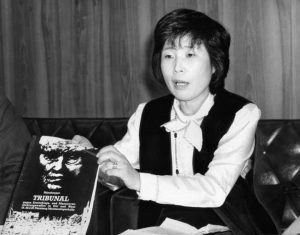My Life—Interview with Keiko Ogura (1937–), interpreter and A-bomb survivor, Part 8: Mock international tribunal denouncing nuclear war held in Nuremberg
May 9, 2023
Felt European passion
While serving as an interpreter-guide for visitors from overseas, I became acquainted with members of the Hiroshima Chapter of the Japan Congress Against A- and H-bombs (Gensuikin), an organization led at the time by Ichiro Moritaki, and began to help look after overseas delegates who were to attend the World Conference of the Japan Congress Against A- and H-Bombs. At that time, I met Petra Kelly, leader of the Green Party from what was at the time West Germany.
In 1983, Ms. Ogura was dispatched by the Hiroshima Gensuikin to the mock international tribunal denouncing nuclear war, held in Nuremberg, West Germany, an event sponsored by the Green Party, as an A-bomb survivor who had witnessed the use of nuclear weapons and would denounce nuclear weapons.
I was asked to attend the mock trial in the place of Mr. Moritaki, who was by that time quite elderly. I spoke for the first time in public about the devastation I had witnessed when I was just eight years old. I talked about how Hiroshima was destroyed by a single atomic bomb in an instant and about how the once distant sea appeared to be very close to me. I communicated to the audience the words inscribed on the Cenotaph for the A-bomb Victims, “For we shall not repeat the evil,” while holding up a photograph of the cenotaph I had brought with me.
Although the speech was only around 15 minutes in length, everyone listened intently and gathered around me when I stepped away from the podium. I sensed firsthand the intense interest that people in Europe had about Hiroshima.
At the venue, I was also reunited with the journalist Robert Jungk, who said, “You cried that you couldn’t, just couldn’t interpret despite my entreaties, and look how far you have come,” hugging me as I walked off the stage. That was the last time I ever saw Mr. Jungk.
The mock trial was attended by Ms. Kelly, Daniel Ellsberg, a former U.S. Department of Defense official turned peace activist, other scholars, activists, and politicians from 11 Western nations and the former Soviet Union. They affirmed that any use of or plans to use nuclear weapons was illegal under international law and would be considered a crime.
That was a time when the citizen’s movement in Europe protesting the deployment of nuclear arms was gaining momentum. Outside of the court, I saw how the anti-nuclear movement had become deeply rooted in German citizens’ daily lives. Ordinary people, ranging from infants to the elderly, participated in the demonstrations cheerfully and freely but with a strong determination to oppose nuclear weapons.
Peace movements are not the province of only activists and large organizations. I felt I had to do what I could, instead of leaving everything up to others. The passion and enthusiasm I had felt in Europe made me wonder whether it would be possible to create a peace movement in Hiroshima open to the participation of every citizen who desired to join.
(Originally published on May 9, 2023)








